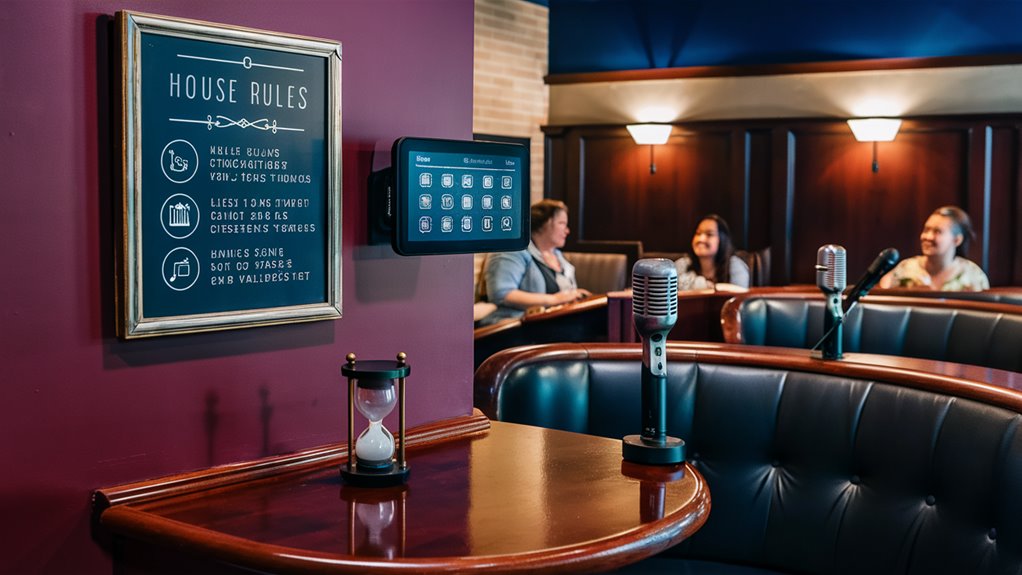Simple Ways to Make Karaoke Fun

Expert karaoke hosts discover methods to keep it entertaining and enjoyable for everyone. By utilizing the best place-control tricks, an ordinary karaoke night can turn into an exciting event.
Top Tips for Karaoke Hosts
Establishing clear house rules and behaving well allows both great singers and newcomers to feel confident and ready to perform. Effective karaoke care involves more than song selection and includes:
Setting Up the Space
- Perfecting sound
- Karaoke Companions
- Arranging seats to draw everyone in
- Ensuring song lists and stage spots are visible
- Using professional lighting for the right ambiance
Overseeing the Shows
- Allowing everyone a turn to sing
- Enforcing time limits for songs and stage time
- Maintaining balanced sound levels
- Providing clear and safe mic rules
Creating a Welcoming Space
- Ensuring a relaxed atmosphere for all skill levels
- Assisting shy singers
- Displaying clear signs for rules and song selection
- Offering kind words to keep participants happy
Following these simple steps ensures smooth operation and keeps the event enjoyable for all. Smart place management and focusing on inclusive participation lay the groundwork for memorable karaoke experiences.
Clear Ways to Share Song Turns
Guide on Fair Turn Sharing in Karaoke
Organizing Effective Line Systems
Efficient turn-taking strategies are crucial for an enjoyable karaoke environment.
Implement a clear sign-up process where individuals list their name and song choice upon arrival, to maintain an orderly queue and prevent confusion.
Key Turn Rules and Ideas
While digital queuing tools might automatically manage turns, clear guidelines remain essential.
Adhere to a two-song limit before resetting the list to ensure fairness.
Arranging singers properly maintains excitement and keeps the party vibrant.
Managing Large Groups
Divide larger groups into smaller singing sessions of 5-6 individuals to minimize wait times and maintain momentum.
This effective grouping strategy for turns enables participants to plan breaks and maintains high spirits.
Consider prioritizing initial turns during busy nights and inform everyone of any changes to ensure equity.
Main Strategies to Manage Show Times
- Utilize digital tools to track turns
- Arrange group turns
- Reduce wait times
- Provide special attention to reserved spots
- Space out the singers
Establishing Time Limits for Performances
Strategy for Managing Karaoke Time

Limiting Stage Time
Establishing performance durations ensures organized karaoke sessions and enhances participant satisfaction. Implement a 3-4 minute limit per performer, accommodating most popular songs and promoting flow.
Addressing Lengthy Songs
Employ brief discussions to resolve timing challenges when lengthy songs are selected:
- Promptly inform participants about long songs
- Suggest alternative song options
- Prevent scheduling errors
Tools for Efficient Time Management
Leverage advanced timing tools to oversee events:
- Digital timing displays counting down
- One-minute warning signals
- Prominent signs for participants
Guidelines for High-Demand Periods
During peak times, adhere to strict policies:
- One song per turn
- Avoid long remixes
- Only select appropriately timed songs
- Apply consistent rules for all
These established rules allow broader participation while ensuring fairness.
Maintaining clear timing protocols elevates the entire karaoke experience and prevents timing conflicts.
Identifying and Managing Challenging Situations within the Audience
Managing Difficult Moments at Karaoke
Effective Crowd Surveillance Techniques
Proficient venue management involves swiftly addressing issues as they arise at a karaoke event.
Having defined behavioral rules and consistently enforcing them ensures enjoyment for all participants.
Closely monitoring the audience and taking immediate action prevents minor issues from escalating.
Recognizing and Handling Common Challenges
Key issues to remain vigilant for include:
- Disruptive noises during performances
- Inappropriate recording of performers
- 호치민 퍼블릭가라오케
- Poor song selections
- Acts that fail to engage the audience
- Excessive alcohol consumption
Optimal Steps for Intervention
Addressing Participants Causing Disruption
- Approach disruptors calmly and professionally
- Engage them privately for a discussion
- Document incidents for reference
- Issue clear warnings regarding future actions
Maintain Security Readiness
- Station staff to monitor the crowd
- Ensure swift communication with security
- Plan clear exit routes
- Keep vital contacts readily accessible
Ensure Smooth Event Flow
- Consistently monitor sound levels
- Verify song appropriateness
- Ensure fair turn distribution
- Maintain equipment functionality
Guidelines for Managing Equipment
Best Practices for Handling Karaoke Equipment
Essential Safety Guidelines for Equipment
Proper equipment handling is vital for maintaining valuable karaoke tools in optimal condition.
Display large signs near important equipment outlining key handling procedures.
Create restricted zones around critical equipment like mixers and systems to prevent setting alterations that might adversely affect sound quality.
Microphone Handling Regulations
Adequate microphone maintenance necessitates explicit guidelines:
- Hold correctly, not too close to the mouth
- Avoid dropping or striking it
